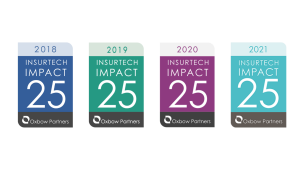We interview Daniel Schreiber, CEO of Lemonade
12 October, 2017 Chris Sandilands
This article was published to our Market Intelligence subscribers on 15 September 2017. To enquire about this product, please contact us.
We recently interviewed Dan Schreiber, CEO of Lemonade (website, Oxbow Partners coverage).
Here are Oxbow Partners’ six take-aways.
1. It’s an Amazon evolution, not a Wikipedia moment
“Berkshire Hathaway and Munich Re back revolutionary P2P insurer” shouted an Intelligent Insurer headline back in September 2016 (before Lemonade had revealed any details of their business model). We are on the record on our blog saying that the revolution might have been called a little early.
Surprisingly, perhaps, Dan seems to agree with us. He uses the analogy of Wikipedia and Amazon: when Wikipedia launched, Encyclopaedia Britannica “evaporated overnight” whereas Amazon is still battling with retailers twenty years after it launched. He expects the insurance industry to evolve like retail; Lemonade is a long-term project.
Whilst Dan does not expect the “precipitous decline” of incumbents, he does nonetheless see major changes ahead for the industry. He thinks that the “good run” of today’s incumbents, which he points out were mostly all around 100 or more years ago, is going to come to an end. “The global leaders 100 years from now will not have the same names as those who dominate today”.
If that’s true, the relevant question for insurers is how this evolution looks over the next ten to twenty years, of course.
2. Doing the basics well is great, but not revolutionary
Other headlines about Lemonade say things like “Sheer genius […] creating a whole new paradigm”, “the most disruptive startup the insurance industry has ever seen.” We are not so sure.
It is true that 27% of claims are processed straight through. However, all other claims receive some level of manual intervention. Dan says, “I think our advantage will be less pronounced [with larger claims]…we’ll be acting in a fairly similar and traditional way.” So there we have it: this is not a business that is completely revolutionising the insurance experience.
The business is selling a fairly standard product to normal people. They’ve got law firms on stand-by for liability claims. When a tree falls on your house, someone turns up to survey the damage and help. In a recent claim this was ‘real Jim’ (as opposed to his AI alter ego) with a bowl of fruit (“the human touch is important, of course”).
Our view that Lemonade is a business with a well-designed and well executed insurance proposition, but nothing revolutionary, remains unchanged. Management have been able to build the business unconstrained by legacy assets – which includes technology, people, culture, public shareholders and more. The impact plays out in both customer experience (e.g. good digital communication) and efficiency (e.g. automation of low emotion claims), but more on that below.
3. AI is not eliminating people – and it’ll be interesting to see how cost plays out
Al lot of prominence is given to Lemonade’s use of AI in the proposition, for example The Guardian: “How artificial intelligence could help make the insurance industry trustworthy”. We certainly expect AI – or, perhaps, more specifically, automation – to play a large role in the Lemonade model.
Dan says that 90% of claims are currently high-frequency, low-severity claims and these lend themselves to intelligent, automated settlement. But, as the example about Real Jim shows above, there will always be a place for people in the business. “There’s a tier at which the bot will hand over to a human very quickly”, says Dan, who also notes that complex claims are “not going to be settled by a bot”.
The question we are asking ourselves is how high up the claims complexity or value spectrum you can automate claims processing. Lemonade currently pays around a third of claims without human involvement. That’s not a huge percentage given Lemonade’s current claims mix and will be a significantly smaller proportion of indemnity spend. If AI doesn’t make significant inroads, Lemonade could end up with an expensive model in a low premium segment, or a claims model that looks pretty undifferentiated in the larger segments.
4. Claims fraud feels unproven
We have commented in a few previous blogs that we worry about claims fraud with all InsurTechs who make a big deal about their claims service. Even if 100% of your target customers are honest, how do you detect and eliminate the professional fraudsters who are looking for weakness in the financial system?
Dan points out that Lemonade has sophisticated systems in place to counteract fraud. The company is “unforgiving” of fraudulent claims and the company has already reported a number of people to the federal authorities.
However, he does concede that it is “entirely possible” that the model could attract the undesirable 0.1%: “if it’s only 0.1%, maybe that’s a price worth paying.”
We continue to have concerns here. The Association of British Insurers estimates that fraud adds, on average, an extra £50 to the annual insurance bill for every UK policyholder, despite the industry spending over £200m per year on combatting fraud. Lemonade’s marketing arguably attracts fraudsters; if detection systems are weak the model will not work as any operating cost or target customer loss ratio advantage is eroded (or event reversed) by fraudsters.
5. There are signs of a different insurer – customer relationship
We were interested to hear Dan say that 4% of claims paid were returned by customers, for example because a lost item was subsequently found. We ran this number past some CUOs and they considered the number remarkable. (“It makes me wonder if they’re paying claims with insufficient validation” said one, adding an interesting perspective on the statistic.) Even the cynical CUO agreed, however, that Lemonade appears to be building a different kind of customer dynamic to “normal” insurers.
On the broader question of the impact of behavioural science on the proposition, Dan admits that he can only speculate as there is not yet any data. He describes some interesting process innovations the company has undertaken to build a trusting, two-way relationship with customers. This is largely influenced by his Chief Behavioural Officer, Professor Dan Ariely. Two examples are making people take an honesty pledge at the beginning of the claims process (rather than just signing a claim at the end) and having to record a video of yourself making the claim because “we don’t like looking at ourselves when we’re being dishonest”.
6. To disrupt insurance, you need to be an insurer
There’s something of a debate ongoing in InsurTech circles about whether you need to launch a full-stack insurer to disrupt the industry. In 2016 Lemonade was the only full-stack insurer to launch; in 2017 a handful of others have launched, such as ONE, Coya and Ottonova (interestingly, all German companies).
Dan is clear that if you want to disrupt insurance you have to be an insurer yourself, otherwise you’re “just a channel” for incumbents. We are increasingly coming to this view (but there are still opportunities to create substantial value by disrupting distribution).
The Oxbow Partners view
We like the proposition. The level of customer-initiated recoveries demonstrates that Lemonade is building a truly differentiated customer relationship. It will be extremely hard, maybe impossible, for insurers to move their brands to this space.
The big question is whether the model is sustainable. In previous analysis we have speculated about the high acquisition costs of low-premium policies. A solution would be moving to higher value policies, but then we wonder to what extent the proposition remains differentiated. On the other hand, if the business continues to serve the lower premium segment, we wonder to what extent its indemnity spend model can be maintained, in which case either the brand or financial model could suffer.
Either way, Lemonade has traction and we think that it will be an increasingly material part of the insurance landscape over the next 5 years, even if investors need to keep piling in the capital.
For incumbents, this means that there is no need to panic. We remain committed to our view that the insurance market is not about to be turned on its head by InsurTechs.
But there is also no room for complacency. The foundations that Lemonade are building cannot be replicated overnight – the customer relationship, company culture, technology leadership. Just because Dan talks about an Amazon evolution rather than a Wikipedia moment, the long-term impact on incumbents is no less dramatic. Ignore Lemonade at your peril.
There’s no one single response. Some will continue to favour startup investment; others will continue to innovate the core business. The most important thing is to avoid a knee-jerk reaction in response to over-hyped and under-analysed market trends, but instead implement a strategic response.


